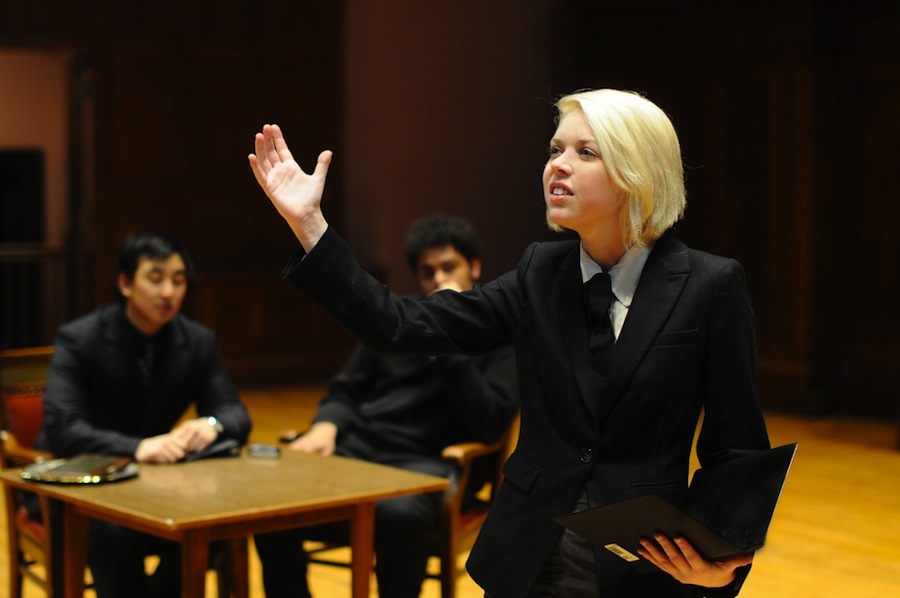Forensics Team Heads to Nationals
President and Co-Chair Erica Rothberg practices her oratory skills as members of the forensics debate team look on. The team is currently preparing for the National tournament.
March 11, 2011
In addition to the sports teams and individual athletes, the Forensics team — Oberlin’s debate squad — will join the ranks of those heading to Nationals.
Created three years ago, the Forensics team has about a dozen members, half of whom actively take part in the debate tournaments. Three members of the team have qualified for Nationals this year: President and Co-Chair College sophomore Erica Rothberg, Co-Chair and College junior Curtis Cook and College junior James Kim.
Rothberg stressed the importance of team maintenance in continuing their success. “Because it’s such a new team and has recently experienced a decisive change in leadership, there are a lot of changes that need to be done,” said Rothberg, who became president after the team’s founders, Michael Blac and Natalie Rygiel, graduated in 2009.
“The changes we’re making are not insignificant,” said Rothberg, who is optimistic about the team’s continued success. “They’re considerable, and reflect not only our outlook but also the way we’re running the season.” She attributed their recent accomplishments to these changes, which are made all the more impressive by the fact that the team is student-run.
“I think we’re the only team in the league that doesn’t have a coach [and so] in the past we’ve been a little sloppy. All the state schools [we compete against] have Communications departments and for credit they participate in the team and these tournaments. It’s what they do,” she explained.
But that is not to say that Oberlin’s squad can’t do better — they actively search out some of the best competition. Last Sunday, the Forensics team participated in a tournament in Normal, IL, at one of the Illinois State University’s campuses, and this weekend, the team is Chicago-bound for a prelude to Nationals. The team will spend the weekend talking to coaches, judges and officials from the National Forensics Association and the American Forensics Association — both of which the Oberlin team is a member — to prepare themselves for the upcoming competition.
On Nationals, Curtis said, “We are very excited to have qualified for the national tournament. Usually the team qualifies every year, but we are particularly excited for this round of national’s as it marks a new step for the team.”
Even though this particular chapter of Oberlin debate is new, it turns out that the Forensics tradition is not entirely new to the school. During a tournament last November, a man came up to Rothberg after the awards ceremony. “He said something along the lines of, ‘I see you’re continuing in Oberlin’s illustrious forensics footsteps.’ I had no idea what he was talking about because as far as I knew, the team was relatively new,” she said.
But after spending some time in Archives, Rothberg discovered that Oberlin College was home to the first women’s debate team in the United States. Rothberg says the earliest form of the Forensics team played a key role in shaping important female minds of the time, and was even one of the first groups to put women’s suffrage on the table, among other controversial topics.
“Before the Civil War, there were lots of formal debates concerning abolitionism. [The team] was very politically active; that’s why Oberlin has been a hotbed from such an early period,” Rothberg says.
Minutes from Archives revealed points of order from early debate team meetings — “Resolved: that sun bonnets are a nuisance. Resolved: that sewing circles are more productive of evil than good. Resolution: that it be appropriate for young ladies to make gestures.”
The times have changed and topics of debate have evolved, but the team has always been small, centered on an intimate group of talented members who would move up consistently in the ranks throughout the years. This system, however, “Is very shortsighted,” said Rothberg, “and is why we don’t have many young members. We want to expand outwards and be more welcoming to new members.”
Rothberg pointed out that the Oberlin Forensics team is the only real option for students interested in debate or oration. Hopefully, once more students become aware of the club’s skill and reputation, the number of Forensics debaters will grow.
“It’s a very powerful tool — not just for training and oratory abilities but for discourse, public speaking abilities and everything that goes along with that: confidence, composure, ability to formulate thoughts correctly and rhetorical analysis,” said Rothberg. “And then there’s also the team component. The solidarity. The team has a really great time together.”
Aiming to recruit more members and raise awareness of the group’s presence on campus, the Forensics team hopes to host an informal Forensics event later this semester, during which Cook plans to perform a stand-up comedy routine and Rothberg some beatnik poetry. The team also intends to hold a series of workshops for students, and hopes to teach a forensics-related ExCo on oration and rhetoric next semester.
“I think, if anything, we owe it to our heritage to pursue this,” said Rothberg of the team. “This is Oberlin. This is where we began!”
























